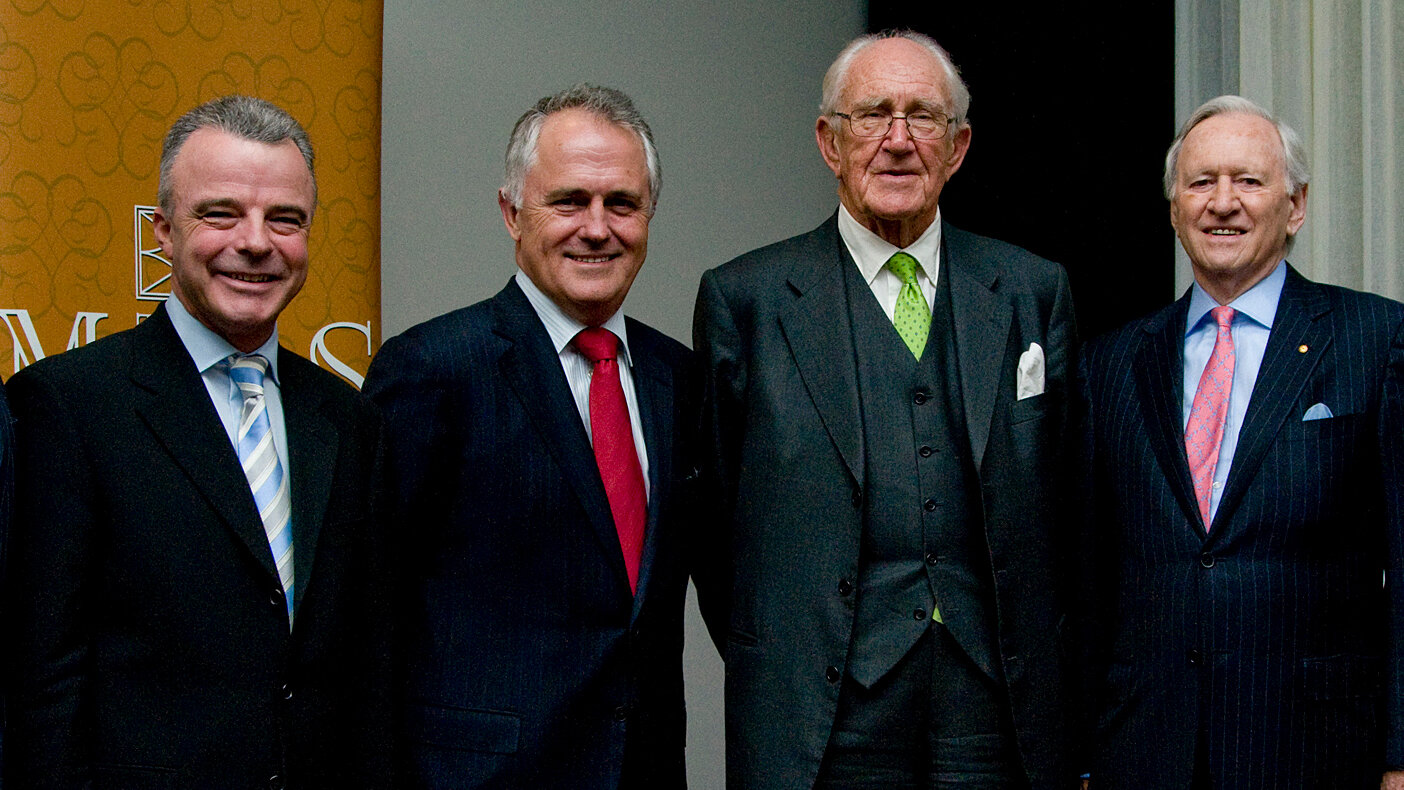A Liberal for all
The Hon Andrew Peacock AC, far right, with (from left to right) the Hon Dr Brendan Nelson AO, the Hon Malcolm Turnbull AC and the Hon Malcolm Fraser AC.
Andrew Peacock appealed to all strands of the Liberal Party’s broad church. He promoted a variety of traditional causes while also championing progressive ideals. By David Furse-Roberts.
By any reckoning Andrew Peacock (1939-2021) was one of the great giants of the Liberal Party of Australia. With his death last week, Scott Morrison hailed the former Liberal leader “as one of our greatest Liberals, who helped shape Australia and the Liberal Party over three decades”. Commanding respect across the political divide, Labor leader Anthony Albanese praised Peacock as a “fine Australian” and one “who advocated for liberal values over so many decades”.
Peacock’s contribution to the “broad church” of the Liberal Party was vast. He promoted traditional causes, such as strengthening the family and combatting drugs, whilst also supporting progressive ideals to advance human rights and world peace. Appealing to all Liberals, he stood for the dignity and freedom of every individual.
A proud and loyal Melbournian, yet well-travelled with early sojourns in Europe and South East Asia, Peacock blended Australian patriotism with benign internationalism. His vision was for a proud and confident Australia to work constructively with its allies to help less fortunate nations and foster world peace. As Foreign Minister, he secured Australia’s membership of the United Nations Disarmament Committee.
Born in Melbourne on 13 February 1939, Andrew Sharp Peacock was educated at Scotch College and the University of Melbourne where he studied law. Like his contemporary, John Howard, Peacock served as President of the Young Liberals and in 1966, he succeeded Sir Robert Menzies as the Member for Kooyong. At the age of just 27, he was elected to Federal Parliament where his rise was impressive.
Within three years, Peacock was appointed to cabinet by Prime Minister John Gorton with whom he had warm relations. After also serving in the ministry of Prime Minister William McMahon, Peacock played a pivotal role in the Fraser Government, serving as Minister for Foreign Affairs from 1975-1980. As Foreign Minister, he revitalised Australia’s critical alliance with the United States and strengthened ties with Japan through the Basic Treaty of Friendship and Cooperation (1976). A defender of human rights, Peacock took a principled stand for the people of Cambodia by refusing Australia’s recognition of the murderous Pol Pot regime.
A lifelong friend of Australia’s nearest neighbour, he continued to champion the interests of Papua New Guinea as it chartered its new course of independence. For his role in facilitating New Guinea independence, Peacock was honoured as a Chief Grand Companion of the Order of Logohu in 2006.
Assuming leadership of the Liberal Party after the defeat of Malcolm Fraser in March 1983, Peacock brought rejuvenation to a demoralised Party. Whilst falling just short of clinching the prime ministership, his combination of personal charisma and policy clarity gave the Opposition a good showing in the 1984 and 1990 elections against a popular Labor Prime Minister in Bob Hawke.
Leading the Liberal Party from 1983-1985, and again in 1989-1990, Peacock campaigned for both a stronger and freer Australia. His vision was one for stronger families, lower taxes and greater personal choice in healthcare and education. Desiring to create greater opportunities for all, he sought to foster a climate of free enterprise where small businesses could grow and prosper.
Of the family, Peacock described it as the “heart of Australia and the rock on which we build our future”. To support families, he proposed measures such as income-splitting to relieve the taxation burden for parents raising children. Desiring to preserve “the best features of our family life”, Peacock called for tough action to be taken against the proliferation of drugs and pornography.
To unlock the potential of Australian business and private enterprise, Peacock’s policies at the 1984 election proved eminently prescient. He pledged to reduce the rate of company tax on small business, and reduce the amount of paperwork and regulation stifling small business. Affirming the principle of reward for effort, he promised that, if elected, there would “be no capital gains tax to rip-off the rewards that so many business people have worked so hard for”.
In healthcare, he promised to restore proper doctor-patient relations and give families the freedom to choose the private health insurance best suited to their needs. Committed to excellence and diversity in education, Peacock supported the revitalisation of the state school system together with grants for pupils at non-government schools.
As Liberal leader, Peacock presided over a party often plagued by leadership tensions between himself and arch-rival, John Howard. Yet for all their personal rivalry, the two Liberal stalwarts shared a vision for a free and prosperous Australia underpinned by strong families, healthy communities and thriving businesses. As Nick Cater observed in The Australian, the liberalism of Peacock was “barely distinguishable from that of John Howard, Brendan Nelson, Tony Abbott or Scott Morrison”.
With John Howard’s ascendency in the mid 1990s, the two men reconciled and in 1996, the Howard Government appointed Peacock as Australia’s ambassador to the United States where he served with distinction. This was followed by a stint as President of Boeing Australia from 2002 to 2007. In retirement, Peacock resided mostly in the US city of Austin, Texas, where he continued to cultivate closer links between Australia and the United States.
For this statesman, the endgame of politics was never so much about ideology as it was about the wellbeing of people. In the vein of Menzies’ practical outlook, he declared: “Politics is not about abstract theories. It is about people and how they want to live their lives.” For Andrew Peacock, the real builders of Australia were not big governments or big unions or big business, but the ordinary men and women who struggled hard against the odds to provide a better life for their children.

